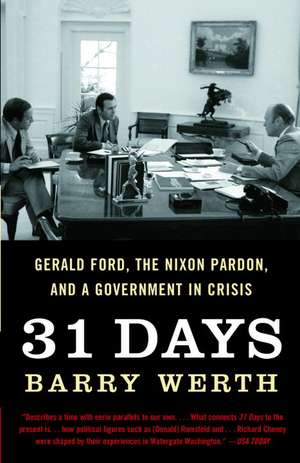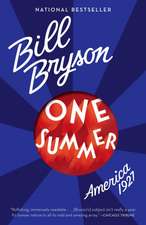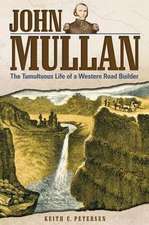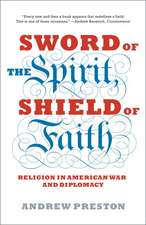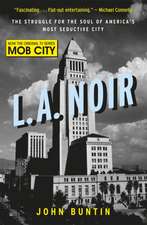31 Days: Gerald Ford, the Nixon Pardon, and a Government in Crisis
Autor Barry Werthen Limba Engleză Paperback – 31 ian 2007
Preț: 130.19 lei
Nou
Puncte Express: 195
Preț estimativ în valută:
24.91€ • 25.96$ • 20.63£
24.91€ • 25.96$ • 20.63£
Carte disponibilă
Livrare economică 13-27 martie
Preluare comenzi: 021 569.72.76
Specificații
ISBN-13: 9781400078684
ISBN-10: 1400078687
Pagini: 398
Dimensiuni: 135 x 203 x 23 mm
Greutate: 0.3 kg
Editura: Anchor Books
ISBN-10: 1400078687
Pagini: 398
Dimensiuni: 135 x 203 x 23 mm
Greutate: 0.3 kg
Editura: Anchor Books
Notă biografică
Barry Werth is the author of The Scarlet Professor, which was a finalist for the National Book Critics Circle Award. He is also the author of The Billion Dollar Molecule and Damages, and wrote the text for Alexander Tsiaras's Architecture and Design of Man and Woman and From Conception to Birth. He lives in Northampton, Massachusetts.
Extras
DAY 1
Friday, August 9, 1974
"Then you destroy yourself . . ."
On his last morning in power, President Richard Nixon arose in the predawn darkness after just a few hours of sleep. He ordered his favorite breakfast of poached eggs and corned-beef hash served to him, alone, in the Lincoln sitting room, the same room where twenty-two months earlier he had retreated by himself to watch on TV as he and Vice President Spiro Agnew were reelected in one of the greatest landslides in American history. The most inward, solitary, and reclusive of presidents--who paradoxically was determined to ensure that every word he spoke, and that was spoken to him, was recorded for history--Nixon to a rare degree determined exactly what he hoped to do and say in public beforehand, by himself, by filling yellow legal pads with notes, arguments, talking points, and exhortations to himself. In a few hours he would say good-bye to the people whom he most depended upon, and whom he'd most let down, betrayed, disappointed, and infuriated--his top administration, who'd served and defended him through the agonies of Watergate and Vietnam.
As through much of this "impeachment summer," the morning sky was dull and overcast, a soggy heat blanketing the South Lawn and the Ellipse, all but hazing out the Washington Monument less than a half mile away. A fire smoldered in Nixon's sitting room fireplace, one of several throughout the White House as aides tossed potentially troublesome documents into the flames. Already assistants had removed the contents of the president's three historic desks--Woodrow Wilson's, in the Oval Office; Dwight Eisenhower's, in room 175 of the Executive Office Building, which Nixon used as a hideaway; and the smaller Lincoln desk, in the president's sitting room in the residence--and packed them carefully into moving boxes now stacked for removal in the hallways. The office of retired General Alexander M. Haig, Jr., Nixon's chief of staff, was cluttered with oversized plastic bags stuffed with shredded files that Haig said were duplicates.
After finishing breakfast, Nixon took a pad from his briefcase, slouched down on the small of his back in an armchair near the hearth, and started writing. Haig, who for the past fifteen months had handled the business of the presidency while Nixon struggled to stay in power, knocked and entered. A tireless regent, whose prideful West Point bearing was never quite concealed by the dark business suits he favored, and whose tenure was circumscribed by a thankless choice between deserting Nixon or going down with him, Haig had defended Nixon even as he concluded that he had to resign and so engineered his abdication. "There is something that will have to be done, Mr. President, and I thought you would rather do it now," he said, apologizing. He took a sheet of thick White House stationery and placed it on the Lincoln desk. Nixon read the single sentence, addressed to Secretary of State Henry Kissinger--I hereby resign the office of President of the United States--and signed it. After Haig left, Nixon returned to his musing, then summoned him back.
"He was haggard and ashen," Haig would recall. "He thanked me for what I had done for him. I thanked him for giving me the opportunity to serve. Nothing of a personal nature was said . . . By now, there was not much that could be said that we did not already understand."
Gripping files and a briefcase, Vice President Gerald Ford stepped into a crowd of reporters in front of the brick split-level house in Alexandria, Virginia, where he'd lived since the early fifties, when he was a young congressman from western Michigan, and which his wife Betty said "kind of grew along with the children." He smiled cautiously--dazed, it seemed, no less than other Americans by the implications of Nixon's announcement during his previous night's prime-time speech from the Oval Office: that he, Nixon, would evacuate the White House for exile at his California compound before noon today. Ford, shortly after, would be sworn in, becoming the "new man on the television set in the living room," as his biographer James Cannon put it.
Now age sixty-one, Ford had never sought the position; he was handed it, more or less, by bipartisan consensus ten months earlier. At the time, he had been a likable legislative blocker and party workhorse--House minority leader--and he'd recently made up his mind to quit politics because he foresaw no hope in the reasonably near future of winning a majority that would elect him speaker. Then Agnew was forced to resign after pleading no contest to a criminal charge of tax evasion, and congressional Democrats assured Nixon that no one but Ford could win confirmation. Facing inflamed Democratic majorities in Congress as Watergate metastasized, Nixon had no alternative. He and Ford had worked together since the late 1940s, when they were junior congressmen in the Chowder and Marching Society, a conservative GOP forum and social club, and Nixon viewed him as someone who did what needed doing--as Seymour Hersh wrote, "who placed loyalty to Nixon and the Republican presidency above his personal ambitions and political well being." Little known outside official Washington, Ford was profoundly aware that he was about to become the only man in history to serve as president without having been elected to national office.
Haig thought the removal of a vice president and president little more than a "silent coup" by Nixon's enemies, and although Ford didn't doubt he had the constitutional authority to govern, others, both right and left, expressed serious concerns about having a president chosen solely by a disgraced predecessor and the warring partisan lawmakers who'd deposed him. Dressed in a medium blue suit and bold, blue and white, "good-guy" striped tie like those favored by bank executives back in Grand Rapids, Ford stood in front of a two-car garage converted into a family playroom and patiently fielded questions about becoming the world's most powerful leader.
"Mr. Vice President, when Harry Truman had the office suddenly thrust upon him, he said he felt that the stars and the moon and the planets had all fallen on him. How do you feel about all that responsibility being dumped on you?"
"I think that's a very apt description." Ford nodded, smiling. "I can tell you better this afternoon after it actually happens."
"Mrs. Ford has hoped you would get out of politics. What is her reaction to the heavy responsibility?"
"Well." He shook his head. "She's just doing her best and we'll wait and see about the other."
Ford climbed into the back of a Cadillac limousine with two advisers. So delicate was the matter of presidential succession, particularly in light of the impeachment proceedings that had forced Nixon to resign and would not simply abate because he stepped aside, and so unpredictable were Nixon's mental state and obsessive suspicion that he might be pushed from power, that Ford's former law partner from Grand Rapids, Philip Buchen, had organized a "secret" outside transition group to plan for the most crucial decisions of the next forty-eight hours, but precious little beyond that. Buchen had arrived at eight that morning accompanied by former Wisconsin congressman John Byrnes, an old Washington ally. As Watergate elevated the choice of a president's men to a matter of utmost national importance, Ford was happy to have his own counsel on how to establish a White House operation independent of Nixon's.
Ford had feared he could forfeit his legitimacy if he appeared at all to want to be president, and like Haig he had lived the last nine months "sitting on a time bomb," trying to support Nixon loyally while not being destroyed himself. Then, during the past two weeks, events in Washington soared to a crescendo in which all three government branches combined to drive Nixon from office. The Supreme Court, ruling 8-0, had ordered the White House to release to federal prosecutors tape recordings, secretly authorized by Nixon, on which the president could clearly be heard telling an aide to order the CIA to interfere with the FBI's probe into the 1972 break-in at Democratic headquarters--the infamous Watergate burglary dismissed by Nixon's men as "third-rate." The release of the tapes, indisputable proof that Nixon had lied to the American people, Congress, prosecutors, his staff, and his family, instantly caused his support among Republicans in Congress to evaporate, and three articles of impeachment were adopted by fateful margins. Special Watergate prosecutor Leon Jaworski, whom Nixon had appointed, believed the tapes "confirmed absolutely" that Nixon was guilty and should have to stand trial. At Nixon's last cabinet meeting three days earlier, Ford had stood up and declared he would have no further comment on the president's problems, as "I am a party of interest."
Crossing the Potomac into Washington, Ford studied the transition group's four-page memo on how to run the White House:
We share your view that there should be no chief of staff at the outset. However, there should be someone who could rapidly and efficiently organize the new staff organization, but who will not be perceived or be eager to be chief of staff.
With a looping left hand Ford wrote, "Rumsfeld." At forty-four, Donald Rumsfeld had been part of Nixon's inner circle, a hard-charging administrator with a much-noted talent for impressing presidents and escaping political cul-de-sacs. The Illinois Republican had known Ford since they served together in the House, where Rumsfeld was one of the chief architects of Ford's rise to leadership. Brash and informal, and with barely concealed presidential ambitions of his own, Rumsfeld had conveniently been out of Washington during the unraveling of Watergate, serving as ambassador to NATO in Europe, but he had grown eager to return and continue his ascent. The job of top presidential aide, while powerful, was a staff position--not the sort of career plum that ambitious politicians like Rumsfeld ordinarily coveted.
Haig, the memo continued, should be asked to stay on to help with the transition but "should not be expected, asked, or be given the option to become your chief of staff." Ford wrote, "OK."
Under the startling intensity of the television lights in the White House East Room--America's gold-curtained, chandeliered "grand ballroom"--hundreds of cabinet and subcabinet members, prominent Republican lawmakers, staffers, and their spouses stood packed together and loudly applauded one last time for their leader. When Pat Nixon had heard shortly before that her husband's personal good-bye to those who'd followed him through the public hell of his second term would be televised, she'd been furious, but Nixon insisted. A crafter of historical moments, he saw one last opportunity to explain himself. "We owe it to our supporters," he told her. "We owe it to the people."
The president's face was drenched in sweat and his red-rimmed eyes fought back tears as he started to speak--the "nightmare end of a long dream," he wrote. His lips trembled and his head sagged into his hunched shoulders. Yet even after weeks and months living in what CBS newsman Howard K. Smith called the "meat grinder" of his undoing, he seemed utterly in command, the dominant political figure of his age delivering a final encore to those who, despite everything, still looked up to him and credited him with greatness. Kissinger, sitting in the front row, remembered Nixon's speech as an "elegy of anguish . . . Having devoted so much of his effort to self control all his life, Nixon seemed impelled to put on display the passions and dreams he had publicly suppressed for so long . . . It was almost too much to have to witness."
Wearing glasses in public for the first time, Nixon seemed to ramble, leaping from statements of gratitude to self-analysis to resentment, but he also managed to deliver a stirring and exquisite eulogy for his years in public life, a string of encomiums and lessons from a lonely virtuoso who saw himself as one of the select few whose vision could shape the fate of nations: a Churchill, a Mao. For him the "moment of truth" was when he sat alone with legal pads, and so what he said now, even as it revealed what he couldn't control, also displayed an adroit self-awareness. He thanked those who had served him and the country during the past five and a half years, jabbed once or twice at the press, defended his administration's scruples ("Mistakes, yes. But for personal gain, never!"), invoked his dead parents ("I remember my old man, I think they would have called him a sort of a little man, a common man . . . Nobody will ever write a book, probably, about my mother; my mother was a saint"), made a few Freudian slips ("This country needs good farmers, good businessmen, good . . . plumbers"), quoted Teddy Roosevelt on loss and redemption, neglected to mention Pat, who was standing and grimacing defiantly behind him, and vowed to survive. "We think that when we suffer a defeat that all is ended. Not true. It is only a beginning, always . . ."
"Greatness comes not when things go always good for you," Nixon said, "but the greatness comes and you are really tested when you take some knocks, some disappointment, when sadness comes, because only if you have been in the deepest valley can you ever know how magnificent it is to be on the highest mountain."
"Always remember," he advised, "others may hate you, but those who hate you don't win unless you hate them, and then you destroy yourself."
Nixon neither confessed to nor apologized for his role in Watergate. But he had disclosed "that amazing, mammoth insight," as his counsel Leonard Garment put it, that it was his hatred of his enemies at home, not theirs of him, that had finished him. Many were in tears; others reeled with fresh fascination at the strange, complex figure before them, and the shining tableau of the loving family that he had brought to grief--Pat, daughters Julie and Tricia, and sons-in-law David Eisenhower and Ed Cox. Kissinger, a Bavarian-born Jew whose family had fled the Nazis when he was a teenager, believed the tragedy originated in Nixon's straitened youth, with his pious, distracted mother and hard-bitten, taciturn father. "Can you imagine what this man would have been had somebody loved him?" wondered Kissinger, a former Harvard professor whom Nixon had appointed both national security adviser and secretary of state, making him the world's most powerful foreign policy adviser and diplomat.
Others could be excused, as they joined the procession out to the South Lawn, where Nixon would depart by presidential helicopter, for worrying less about Nixon and more about themselves. Besides those who held elected office, Nixon was crucial to their hopes and ambitions. Yet in two hours Ford would control the government and the party. What was more, the "presidential timetable," especially for Republicans, had been upended. Under the constitutional arrangement that enabled Nixon to choose Ford, Ford now would nominate his own vice president. But because Ford had told the Senate during his confirmation hearings that he wouldn't run for president in 1976, an incumbent vice president would become the heir apparent for the party's nomination. A lifelong climb to the top politically was a combat version of the children's game Chutes and Ladders, normally taking decades. The GOP game board suddenly was rife with new battle lines and angles of attack--and accelerating opportunities.
From the Hardcover edition.
Friday, August 9, 1974
"Then you destroy yourself . . ."
On his last morning in power, President Richard Nixon arose in the predawn darkness after just a few hours of sleep. He ordered his favorite breakfast of poached eggs and corned-beef hash served to him, alone, in the Lincoln sitting room, the same room where twenty-two months earlier he had retreated by himself to watch on TV as he and Vice President Spiro Agnew were reelected in one of the greatest landslides in American history. The most inward, solitary, and reclusive of presidents--who paradoxically was determined to ensure that every word he spoke, and that was spoken to him, was recorded for history--Nixon to a rare degree determined exactly what he hoped to do and say in public beforehand, by himself, by filling yellow legal pads with notes, arguments, talking points, and exhortations to himself. In a few hours he would say good-bye to the people whom he most depended upon, and whom he'd most let down, betrayed, disappointed, and infuriated--his top administration, who'd served and defended him through the agonies of Watergate and Vietnam.
As through much of this "impeachment summer," the morning sky was dull and overcast, a soggy heat blanketing the South Lawn and the Ellipse, all but hazing out the Washington Monument less than a half mile away. A fire smoldered in Nixon's sitting room fireplace, one of several throughout the White House as aides tossed potentially troublesome documents into the flames. Already assistants had removed the contents of the president's three historic desks--Woodrow Wilson's, in the Oval Office; Dwight Eisenhower's, in room 175 of the Executive Office Building, which Nixon used as a hideaway; and the smaller Lincoln desk, in the president's sitting room in the residence--and packed them carefully into moving boxes now stacked for removal in the hallways. The office of retired General Alexander M. Haig, Jr., Nixon's chief of staff, was cluttered with oversized plastic bags stuffed with shredded files that Haig said were duplicates.
After finishing breakfast, Nixon took a pad from his briefcase, slouched down on the small of his back in an armchair near the hearth, and started writing. Haig, who for the past fifteen months had handled the business of the presidency while Nixon struggled to stay in power, knocked and entered. A tireless regent, whose prideful West Point bearing was never quite concealed by the dark business suits he favored, and whose tenure was circumscribed by a thankless choice between deserting Nixon or going down with him, Haig had defended Nixon even as he concluded that he had to resign and so engineered his abdication. "There is something that will have to be done, Mr. President, and I thought you would rather do it now," he said, apologizing. He took a sheet of thick White House stationery and placed it on the Lincoln desk. Nixon read the single sentence, addressed to Secretary of State Henry Kissinger--I hereby resign the office of President of the United States--and signed it. After Haig left, Nixon returned to his musing, then summoned him back.
"He was haggard and ashen," Haig would recall. "He thanked me for what I had done for him. I thanked him for giving me the opportunity to serve. Nothing of a personal nature was said . . . By now, there was not much that could be said that we did not already understand."
Gripping files and a briefcase, Vice President Gerald Ford stepped into a crowd of reporters in front of the brick split-level house in Alexandria, Virginia, where he'd lived since the early fifties, when he was a young congressman from western Michigan, and which his wife Betty said "kind of grew along with the children." He smiled cautiously--dazed, it seemed, no less than other Americans by the implications of Nixon's announcement during his previous night's prime-time speech from the Oval Office: that he, Nixon, would evacuate the White House for exile at his California compound before noon today. Ford, shortly after, would be sworn in, becoming the "new man on the television set in the living room," as his biographer James Cannon put it.
Now age sixty-one, Ford had never sought the position; he was handed it, more or less, by bipartisan consensus ten months earlier. At the time, he had been a likable legislative blocker and party workhorse--House minority leader--and he'd recently made up his mind to quit politics because he foresaw no hope in the reasonably near future of winning a majority that would elect him speaker. Then Agnew was forced to resign after pleading no contest to a criminal charge of tax evasion, and congressional Democrats assured Nixon that no one but Ford could win confirmation. Facing inflamed Democratic majorities in Congress as Watergate metastasized, Nixon had no alternative. He and Ford had worked together since the late 1940s, when they were junior congressmen in the Chowder and Marching Society, a conservative GOP forum and social club, and Nixon viewed him as someone who did what needed doing--as Seymour Hersh wrote, "who placed loyalty to Nixon and the Republican presidency above his personal ambitions and political well being." Little known outside official Washington, Ford was profoundly aware that he was about to become the only man in history to serve as president without having been elected to national office.
Haig thought the removal of a vice president and president little more than a "silent coup" by Nixon's enemies, and although Ford didn't doubt he had the constitutional authority to govern, others, both right and left, expressed serious concerns about having a president chosen solely by a disgraced predecessor and the warring partisan lawmakers who'd deposed him. Dressed in a medium blue suit and bold, blue and white, "good-guy" striped tie like those favored by bank executives back in Grand Rapids, Ford stood in front of a two-car garage converted into a family playroom and patiently fielded questions about becoming the world's most powerful leader.
"Mr. Vice President, when Harry Truman had the office suddenly thrust upon him, he said he felt that the stars and the moon and the planets had all fallen on him. How do you feel about all that responsibility being dumped on you?"
"I think that's a very apt description." Ford nodded, smiling. "I can tell you better this afternoon after it actually happens."
"Mrs. Ford has hoped you would get out of politics. What is her reaction to the heavy responsibility?"
"Well." He shook his head. "She's just doing her best and we'll wait and see about the other."
Ford climbed into the back of a Cadillac limousine with two advisers. So delicate was the matter of presidential succession, particularly in light of the impeachment proceedings that had forced Nixon to resign and would not simply abate because he stepped aside, and so unpredictable were Nixon's mental state and obsessive suspicion that he might be pushed from power, that Ford's former law partner from Grand Rapids, Philip Buchen, had organized a "secret" outside transition group to plan for the most crucial decisions of the next forty-eight hours, but precious little beyond that. Buchen had arrived at eight that morning accompanied by former Wisconsin congressman John Byrnes, an old Washington ally. As Watergate elevated the choice of a president's men to a matter of utmost national importance, Ford was happy to have his own counsel on how to establish a White House operation independent of Nixon's.
Ford had feared he could forfeit his legitimacy if he appeared at all to want to be president, and like Haig he had lived the last nine months "sitting on a time bomb," trying to support Nixon loyally while not being destroyed himself. Then, during the past two weeks, events in Washington soared to a crescendo in which all three government branches combined to drive Nixon from office. The Supreme Court, ruling 8-0, had ordered the White House to release to federal prosecutors tape recordings, secretly authorized by Nixon, on which the president could clearly be heard telling an aide to order the CIA to interfere with the FBI's probe into the 1972 break-in at Democratic headquarters--the infamous Watergate burglary dismissed by Nixon's men as "third-rate." The release of the tapes, indisputable proof that Nixon had lied to the American people, Congress, prosecutors, his staff, and his family, instantly caused his support among Republicans in Congress to evaporate, and three articles of impeachment were adopted by fateful margins. Special Watergate prosecutor Leon Jaworski, whom Nixon had appointed, believed the tapes "confirmed absolutely" that Nixon was guilty and should have to stand trial. At Nixon's last cabinet meeting three days earlier, Ford had stood up and declared he would have no further comment on the president's problems, as "I am a party of interest."
Crossing the Potomac into Washington, Ford studied the transition group's four-page memo on how to run the White House:
We share your view that there should be no chief of staff at the outset. However, there should be someone who could rapidly and efficiently organize the new staff organization, but who will not be perceived or be eager to be chief of staff.
With a looping left hand Ford wrote, "Rumsfeld." At forty-four, Donald Rumsfeld had been part of Nixon's inner circle, a hard-charging administrator with a much-noted talent for impressing presidents and escaping political cul-de-sacs. The Illinois Republican had known Ford since they served together in the House, where Rumsfeld was one of the chief architects of Ford's rise to leadership. Brash and informal, and with barely concealed presidential ambitions of his own, Rumsfeld had conveniently been out of Washington during the unraveling of Watergate, serving as ambassador to NATO in Europe, but he had grown eager to return and continue his ascent. The job of top presidential aide, while powerful, was a staff position--not the sort of career plum that ambitious politicians like Rumsfeld ordinarily coveted.
Haig, the memo continued, should be asked to stay on to help with the transition but "should not be expected, asked, or be given the option to become your chief of staff." Ford wrote, "OK."
Under the startling intensity of the television lights in the White House East Room--America's gold-curtained, chandeliered "grand ballroom"--hundreds of cabinet and subcabinet members, prominent Republican lawmakers, staffers, and their spouses stood packed together and loudly applauded one last time for their leader. When Pat Nixon had heard shortly before that her husband's personal good-bye to those who'd followed him through the public hell of his second term would be televised, she'd been furious, but Nixon insisted. A crafter of historical moments, he saw one last opportunity to explain himself. "We owe it to our supporters," he told her. "We owe it to the people."
The president's face was drenched in sweat and his red-rimmed eyes fought back tears as he started to speak--the "nightmare end of a long dream," he wrote. His lips trembled and his head sagged into his hunched shoulders. Yet even after weeks and months living in what CBS newsman Howard K. Smith called the "meat grinder" of his undoing, he seemed utterly in command, the dominant political figure of his age delivering a final encore to those who, despite everything, still looked up to him and credited him with greatness. Kissinger, sitting in the front row, remembered Nixon's speech as an "elegy of anguish . . . Having devoted so much of his effort to self control all his life, Nixon seemed impelled to put on display the passions and dreams he had publicly suppressed for so long . . . It was almost too much to have to witness."
Wearing glasses in public for the first time, Nixon seemed to ramble, leaping from statements of gratitude to self-analysis to resentment, but he also managed to deliver a stirring and exquisite eulogy for his years in public life, a string of encomiums and lessons from a lonely virtuoso who saw himself as one of the select few whose vision could shape the fate of nations: a Churchill, a Mao. For him the "moment of truth" was when he sat alone with legal pads, and so what he said now, even as it revealed what he couldn't control, also displayed an adroit self-awareness. He thanked those who had served him and the country during the past five and a half years, jabbed once or twice at the press, defended his administration's scruples ("Mistakes, yes. But for personal gain, never!"), invoked his dead parents ("I remember my old man, I think they would have called him a sort of a little man, a common man . . . Nobody will ever write a book, probably, about my mother; my mother was a saint"), made a few Freudian slips ("This country needs good farmers, good businessmen, good . . . plumbers"), quoted Teddy Roosevelt on loss and redemption, neglected to mention Pat, who was standing and grimacing defiantly behind him, and vowed to survive. "We think that when we suffer a defeat that all is ended. Not true. It is only a beginning, always . . ."
"Greatness comes not when things go always good for you," Nixon said, "but the greatness comes and you are really tested when you take some knocks, some disappointment, when sadness comes, because only if you have been in the deepest valley can you ever know how magnificent it is to be on the highest mountain."
"Always remember," he advised, "others may hate you, but those who hate you don't win unless you hate them, and then you destroy yourself."
Nixon neither confessed to nor apologized for his role in Watergate. But he had disclosed "that amazing, mammoth insight," as his counsel Leonard Garment put it, that it was his hatred of his enemies at home, not theirs of him, that had finished him. Many were in tears; others reeled with fresh fascination at the strange, complex figure before them, and the shining tableau of the loving family that he had brought to grief--Pat, daughters Julie and Tricia, and sons-in-law David Eisenhower and Ed Cox. Kissinger, a Bavarian-born Jew whose family had fled the Nazis when he was a teenager, believed the tragedy originated in Nixon's straitened youth, with his pious, distracted mother and hard-bitten, taciturn father. "Can you imagine what this man would have been had somebody loved him?" wondered Kissinger, a former Harvard professor whom Nixon had appointed both national security adviser and secretary of state, making him the world's most powerful foreign policy adviser and diplomat.
Others could be excused, as they joined the procession out to the South Lawn, where Nixon would depart by presidential helicopter, for worrying less about Nixon and more about themselves. Besides those who held elected office, Nixon was crucial to their hopes and ambitions. Yet in two hours Ford would control the government and the party. What was more, the "presidential timetable," especially for Republicans, had been upended. Under the constitutional arrangement that enabled Nixon to choose Ford, Ford now would nominate his own vice president. But because Ford had told the Senate during his confirmation hearings that he wouldn't run for president in 1976, an incumbent vice president would become the heir apparent for the party's nomination. A lifelong climb to the top politically was a combat version of the children's game Chutes and Ladders, normally taking decades. The GOP game board suddenly was rife with new battle lines and angles of attack--and accelerating opportunities.
From the Hardcover edition.
Recenzii
“Describes a time with eerie parallels to our own…What connects 31 Days to the present is . . . how political figures such as [Donald] Rumsfeld and . . . Richard Cheney were shaped by their experiences in Watergate Washington” —USA Today “Compelling. . . . [A] gripping narrative account of Ford’s first weeks in office. . . . A period in which some of the key players in the Bush administration rose to power and established their mastery of intra-administration battles, a period that . . . serves as a bookend to our own.”—The New York Times“Never has the Ford administration seemed so gripping.” —The Atlantic Monthly
Descriere
The author takes readers inside the White House during the tumultuous days following Nixon's resignation and the swearing-in of Gerald Ford, revealing the ruthless maneuvering and day-to-day politicking behind everything from the pardon of Nixon to the rise of a new cadre of Republican movers and shakers.
